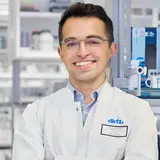Hematology and Immune Engineering
- Cell and Tumor Biology
- Junior Research Group

Dr. Mirco Friedrich
Group leader
Integrating synthetic immunology, genome editing, and AI-driven bioengineering, our lab develops innovative strategies to reprogram the human immune system for cancer prevention, enhanced immune resilience, and healthy aging. By rapidly translating scientific discoveries into transformative therapies for our patients, we work toward a future where cancer and aging are no longer inevitable.

Our Research
Synthetic Immunology for Cancer Defense and Prevention: Engineering Immune Resilience against Blood Cancers
The Problem:
Cancer remains one of the leading causes of death worldwide, yet our ability to harness the immune system for its treatment is still incomplete. While immunotherapies such as CAR-T cells and bispecific antibodies have revolutionized cancer treatment, they remain ineffective for many patients due to tumor-induced immune suppression, unpredictable responses and patient factors, and eventual disease relapse. A fundamental question in medicine is: How can we engineer an immune system that is resilient enough to detect, fight, and prevent cancer?
Our Approach:
Our lab applies synthetic immunology to overcome immune barriers in blood cancers, such as leukemias and multiple myeloma. We design engineered T cells that evade immune suppression, enhance tumor recognition, and persist long-term to prevent relapse. Our studies on novel immune checkpoints (Kilian, Friedrich. Lu et al., Sci Immunol2024), T cell dynamics in autologous stem cell transplantation and bispecific antibody therapy (Friedrich et al., Cancer Cell 2023), and neoantigen-recognizing T cells in hematological malignancies (Wagner, Kehl, Steiger et al., Blood 2024, Kehl et al., JITC 2022) shape the next generation of therapies aimed at making cancer an immune-controlled disease.
AI-guided Immunology: Predicting Human Immune Responses and Designing Safer Gene Therapies
The Problem:
One of the biggest challenges in medicine is that no two patients respond the same way to a given therapy. The complexity of human immune responses — shaped by genetics, prior infections, and tumor evolution — makes it difficult to predict who will benefit from treatment and who will not. At the same time, as we enter the era of genome editing and personalized medicine, how do we ensure that these technologies are not only effective but also safe and accessible to all patients?
Our Approach:
We are pioneering AI-driven immunotherapy design to bring precision medicine closer to reality. Our work has demonstrated that AI can be used to engineer genome-editing enzymes that evade immune detection, reducing the risks of immune rejection in CRISPR-based therapies (Raghavan, Friedrich et al., Nat Commun 2025). Additionally, we are developing an AI-powered decision-support tool for hematology that integrates clinical, genomic, and immunological data to optimize treatment selection for blood cancer patients. This technology will allow real-time, data-driven adjustments to treatment strategies for point-of-care diagnostics and better therapy decisions.
Reprogramming Immunity: in vivo Genome Engineering for Health and Longevity
The Problem:
Aging is the greatest risk factor for disease, yet modern medicine still treats it as an inevitability rather than an opportunity for intervention. As people live longer, age-related immune decline increases susceptibility to cancer, infections, and poor vaccine responses. Meanwhile, genetic diseases remain largely untreatable because we lack safe and efficient ways to edit the human genome in living patients. How can we rewrite biological programs to extend healthy lifespan, boost the immune system as we age and treat previously incurable diseases?
Our Approach:
Our lab is developing in vivo genome engineering as a strategy to enhance immune resilience and longevity. Our preliminary research demonstrates that mRNA-based reprogramming can transiently restore thymic function, rejuvenating immune responses in aged organisms. In parallel, we are developing next-generation delivery systems that enable precise targeting of genome-editing tools and mRNA to specific cells and organs via systemic administration (Kreitz, Friedrich et al., Nature 2024) These advances open the door to future therapies that enhance immune function, prevent disease, and promote healthy aging.
Fast-Tracking Innovation: First-in-Human Trials for Next-Generation Immunotherapies
The Problem:
Scientific discoveries in the lab have little impact unless they reach patients. Despite groundbreaking progress in immunotherapy and genome engineering, it often takes decades for promising therapies to become widely available. Many innovations are lost in translation due to regulatory hurdles, manufacturing complexities, and the difficulty of demonstrating safety in humans. The key question is: How can we accelerate the development of transformative treatments in Germany while maintaining the highest standards of safety and efficacy?
Our Approach:
Our lab bridges the gap between discovery and patient care by designing and leading experimental first-in-human clinical trials that translate synthetic immunology and genome engineering into real-world therapies. Our PERSIST-B7H6 Trial supported by the National Center for Tumor Diseases (NCT) is the first to test CRISPR-edited CAR-T cells engineered for enhanced persistence, based on our discovery that B7H6 acts as an immune checkpoint limiting CAR-T survival (Kilian, Friedrich, Lu et al., Sci Immunol 2024).
Building on our preclinical work in thymus rejuvenation using mRNA and advanced delivery systems, we are actively planning further first-in-human trials to assess the therapeutic potential of mRNA-driven immune reprogramming. These efforts are being pursued in close collaboration with the Department of Hematology, Oncology, and Rheumatology at Heidelberg University Hospital, with the aim to develop innovative treatments for immune aging and disease prevention.
By rapidly validating these therapies in patients with high-risk blood cancers and lymphomas, we aim to shorten the path from lab to clinic and make engineered immune therapies a reality for more patients and our aging society.
Our Team
4 Employees
- Show profile

Dr. Mirco Friedrich
Group leader
- Show profile

Niklas Kehl
Physician Scientist & Bioinformatics Lead
- Show profile

Anna Metzler
PhD candidate
- Show profile

Tim Robin Wagner
Postdoc & Lab Manager
Highlight Publications
Raghavan, R.*, Friedrich, MJ.*, King, I., Kilian, M., Platten, M., Macrae, R. Song, Y., Nivon, L., Zhang, F.
Kilian, M.*, Friedrich, MJ.*, Lu, K.*, Vonhören, D., Jansky, S., Michel, J., Keib, A., Stange, S., Hackert, N., […] Müller-Tidow, C., Schmitt, M., Platten, M.
Wagner, TR., Kehl, N., Steiger, S., Boschert, T., Kilian, M. Foster, KA., Goldschmidt, H., Weinhold, N., Carr, SA., Yong, K., Müller-Tidow, C., Rippe, K. Raab, MS., Eichmüller, SB., and Friedrich, MJ.
Chen, H., Liu, D., Aditham, A., Huang, J., Guo, J., Kostas, F., Maher, K., Friedrich, MJ., Xavier, R.J., Zhang, F., and Wang, X.
Kreitz, J., Friedrich, M., Guru, A., Lash, B., Saito, M., Macrae, RK., and Zhang, F.
Friedrich, MJ., Neri, P., Kehl, N., Michel, Leblay, N., J., Lee, H., Barakat, E., Ahn, S., Goldschmidt, H., Platten, M., Weinhold, N., Raab, M.-S. and Bahlis, N. J.
Kehl, N., Kilian, M., Michel, J., Wagner, T. R., Uhrig, S., Brobeil, A., Sester, L.-S., Blobner, S., Steiger, SA. (…) and Friedrich, MJ.
Friedrich, M., Sankowski, R., Bunse, L., Kilian, M., Green, E., Ramallo Guevara, C., Pusch, S., Poschet, G., Sanghvi, K., Hahn, M., Bunse, T., Münch, P., Gegner, H. M., (…) Priller, J., Heiland, S., Gutcher, I., Quintana, F. J., von Deimling, A., Wick, W., Prinz, M. and Platten, M.
Get in touch with us
